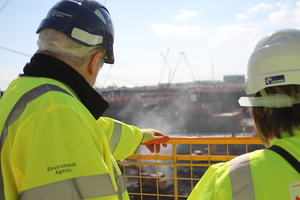Change to storage of radioactive waste granted for Hinkley Point C
The Environment Agency has today agreed to changes to the environmental permit for Hinkley Point C nuclear power station near Bridgwater.

Dry storage of radioactive waste is now allowed in the environmental permit for Hinkley Point C
This results from a change to the way radioactive waste will be stored at the site.
Pressurised water reactors at Hinkley Point C will use uranium fuel to create heat and generate electricity when operating. Once used within the reactor, nuclear fuel will undergo a period of cooling in a fuel pool. It will then be stored on-site before being sent off-site to a Geological Disposal Facility (GDF).
NNB Generation Company (HPC) Limited was originally issued a radioactive substances environmental permit in 2013. In the original design radioactive spent fuel was to be stored on-site in ‘wet storage’ - a method of submerging and storing in water.
The operator earlier this year applied to the Environment Agency for a variation to its permit. This was to reflect the change in the technology by which it will store spent nuclear fuel, from wet storage to ‘dry storage’. Dry storage will see used nuclear fuel stored in sealed containers within a facility before it is sent to the GDF. The permit covers the associated discharges, not the storage of waste. However, a change to the permit was required to remove or amend specific conditions related to the previous wet storage technology that are no longer relevant.
The operator has said altering the storage method will not change the expected radiation dose from discharges to the general public or the wider environment. Such doses will remain extremely small.
Following a 4-week public consultation over the proposed change, the Environment Agency has today agreed to amend the permit. More than 40 organisations and members of the public responded to the consultation.
A spokesperson for the Environment Agency said:
We agree with the applicant’s demonstration that the proposed change to spent nuclear fuel storage represents Best Available Technique (BAT) for Hinkley Point C. We are satisfied that the change will not lead to an increase in radioactive discharges and will not cause adverse radiological impact on people and the environment.
The changes will not impact our ability to effectively regulate the site and activities. We will continue to assess spent fuel storage and its impact at Hinkley Point C to ensure that discharges are minimised and that BAT is applied.
Separately, NNB Generation Company (HPC) Limited will be seeking the necessary changes to its Development Consent Order for Hinkley Point C later this year.
More information is available at: Consultation on a variation to the Radioactive Substances Regulation Environmental Permit for Hinkley Point C (HPC) Nuclear Power Station, nr Bridgwater, TA5 1UD - Environment Agency - Citizen Space.
Background
For more about the Environment Agency and its regulatory role with Hinkley Point C visit Hinkley Point: nuclear regulation - GOV.UK.